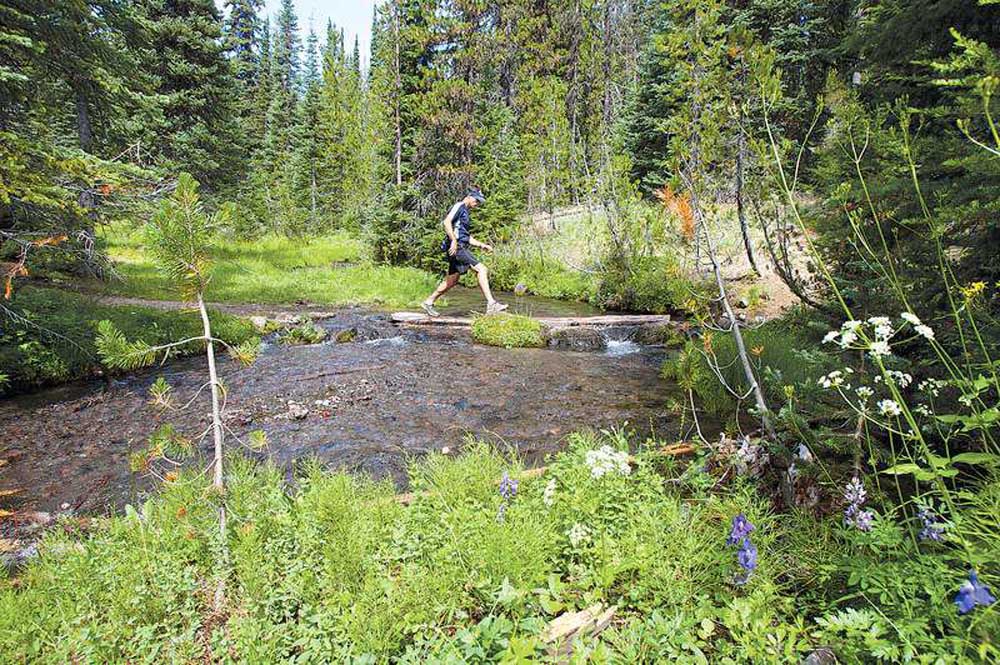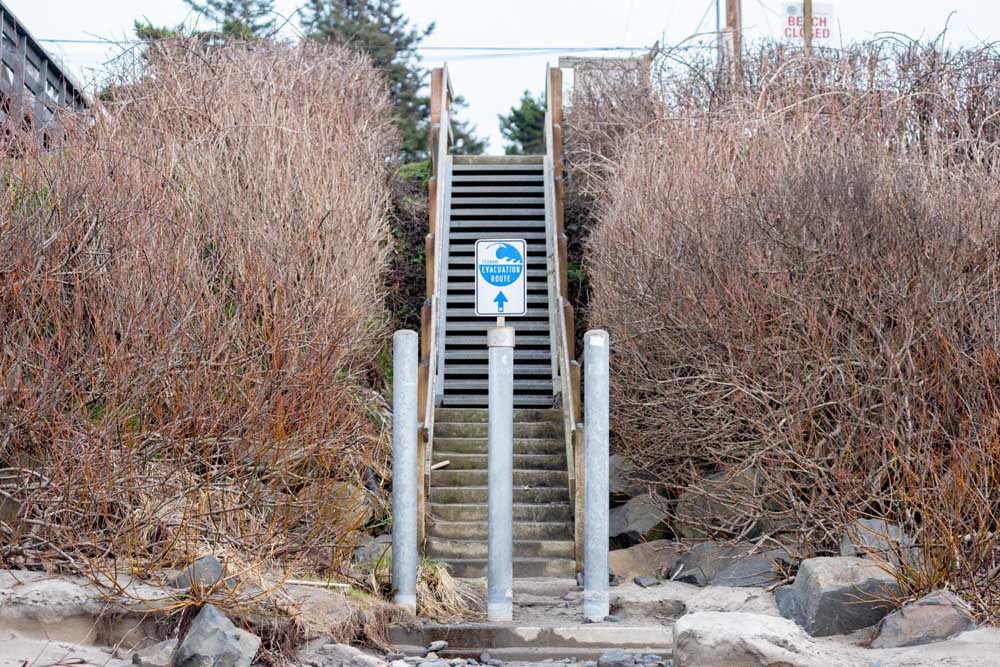Under Trump, environmental fight on horizon
Published 12:00 am Saturday, November 12, 2016

- The Bulletin file photoA hiker crosses Soda Creek in the Deschutes National Forest.
Speculation has started over who may lead federal agencies that govern public lands and environment under Donald Trump’s presidency and how the new administration will manage those lands and the environment in Central Oregon.
“The environment is going to become a war zone,” said Char Miller, the director of the environmental analysis program and a professor at Pomona College in California who has written several books on public lands issues and environmental history in the West. “Whether it’s inside the Beltway or out in the Cascades, the fight is on.”
Trending
Miller expects to see more cattle grazing, more forest logging, more mining and more extraction of natural resources on public lands and possible reinterpretation of laws like the Clean Water Act, Clean Air Act and Endangered Species Act.
He called the Trump administration “the greatest nightmare of a generation” for environmentalists.
Mary Wood, a law professor and faculty director of the Environmental and Natural Resources Law Center at University of Oregon, expects that “regulatory protection in environmental law just flew out the window.” Wood called Trump’s likely course a “180-degree departure from the notion that government manages resources for the people.”
Craig Kauffman, assistant professor of political science and environmental studies at the University of Oregon, will watch for the appointment of leaders to agencies like the Environmental Protection Agency, the U.S. Department of Interior and the U.S. Department of Agriculture. Those latter two departments contain the Bureau of Land Management and the U.S. Forest Service. The appointments matter largely because they will influence the way related laws — including existing laws — get interpreted, implemented and enforced through regulations.
“So it matters a great deal who leads these agencies and the ideology they bring forth,” Kauffman said, noting a lot of leeway exists in interpreting laws like the Clean Air Act and Clean Water Act.
Kauffman expects to see more local government ordinances on related issues, similar to the way communities have lately sought to limit fracking near them, for instance. Wood said American people will need to take part in all three branches of government — through federal agencies’ proceedings, legislation and lawsuits — at local, state and national levels “with a clarity we’ve not seen before.”
Trending
Broad goals
Trump’s transition website does not include the environment in its list of issues. It does include energy independence under the category of “making America secure again.” That section calls for policies that will “make full use of our domestic energy sources, including renewable energy sources,” and that will transform the country into an energy exporter.
“America is sitting on a treasure trove of untapped energy,” the site states, pointing to coal, oil and natural gas resources that the administration plans to access. The administration calls for opening onshore and offshore leasing on federal lands and water for fossil fuel production, streamlining permitting processes for energy projects and ending the “war on coal” partly by rescinding coal-related regulations.
The administration also calls for eliminating the Waters of the U.S. rule, the Climate Action Plan and the Clean Power Plan. The recent waters rule had sought to clarify the waterways covered under the Clean Water Act through the EPA. President Barack Obama’s Climate Action Plan laid out various strategies for cutting carbon pollution, setting ways to address climate impacts and leading international efforts to address climate change. The EPA’s Clean Power Plan sought to reduce carbon pollution from power plants as a way to address climate change.
Local resources
Kevin Larkin, district ranger at Bend-Fort Rock Ranger District of Deschutes National Forest, noted that as executive branch employees who serve the administration, Deschutes forest managers do not take positions on policies.
But in general, the current process involved with new or expanded activities at the forest depends on the project’s size. A proposal can go through a more administrative rule-making or a more involved legislative route, for instance.
“Everything’s dependent on the scale and scope of any proposed changes,” Larkin said, but the current processes ensure public comment.
For instance, no mining or drilling currently takes place in Deschutes forest, but under existing procedures, any proposal to do that activity there would require changes to the forest’s management plan. Any specific proposals would need to go through the National Environmental Policy Act that requires all branches of government to consider natural resources for projects that affect the environment. Changing the forest management plan would likely take years. Larkin said he’s not aware of any subsurface resources like oil, gas or coal that would draw such interest.
Opening more areas for timber harvest would similarly require either rule-making or legislation, with both routes involving public comment. And the NEPA process would still apply to consider effects of timber harvest activities.
Of course, if legislation changed NEPA, it’s a different story, Larkin said.
But the Forest Service continues maintaining and restoring the resilience of national forests and helping people to recreate there — work that it has done through all sorts of political changes, Larkin said.
“Our mission remains the same, and we’ve held steady to that vision for a little over 110 years,” Larkin said.
Reaction
Travis Joseph, president of Portland-based American Forest Resource Council — a trade association made up of forest products industry-related manufacturers and companies that focuses on timber harvesting on public lands through the West — wants to see more timber harvest.
Joseph pointed to an opportunity for that through an already-scheduled update to the Northwest Forest Plan that guides timber production and wildlife habitat management at public lands in the Northwest, including Oregon. The plan so far has not worked for rural communities, private industries and forest health, Joseph said. He also aims to watch how Forest Service and BLM lands are managed under the new administration and who gets appointed to such agencies.
“This administration is really going to shape the trajectory of public lands management,” Joseph said. “We’re obviously paying attention.”
Trout Unlimited emphasized its ability to work in a bipartisan way, but raised concerns over plans to backtrack on the recent clean waters rule and on climate change.
The waters rule protects headwater streams — the smallest parts of rivers furthest from the waterway’s endpoint or merging point with another stream, and the sources of rivers in Oregon and the West. The group has warned that funding for restoration projects could face threats under the new administration, arguing that protecting clean water is not a partisan issue. The group also notes that restoration projects help guard against the impacts of climate change so fish can survive.
“It’s a very real phenomena,” said Trout Unlimited spokesman Chris Hunt. “We’re concerned that the administration’s somewhat myopic view on climate change could trickle down to these agencies.”
Trout Unlimited and The Theodore Roosevelt Conservation Partnership, a group that advocates for hunting and fishing access, want to see public lands remain under federal management rather than state control and were heartened that Trump has not offered support to calls for state control of those lands. The groups argue that states tend to sell such lands off when they face difficult economic times. They also usually cannot provide the fire control, wildlife management, trail and road maintenance and other necessary care that the lands need, Hunt said.
“Those public lands belong to every single American as a birthright,” Hunt said.
Oregon Natural Desert Association said in a statement that it plans “to boldly and passionately advocate for Oregon’s high desert,” calling the region’s public lands a treasure to “steward with care.”
— Reporter: 541-617-7812, hcorrigan@bendbulletin.com








